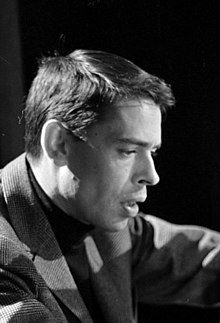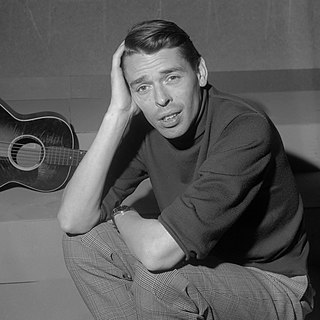
Jacques Romain Georges Brel was a Belgian singer and actor who composed and performed theatrical songs. He generated a large, devoted following—initially in Belgium and France, but later throughout the world. He is considered a master of the modern chanson.

An extended play (EP) is a musical recording that contains more tracks than a single but fewer than an album or LP record. Contemporary EPs generally contain four to nine tracks and have a playing time of 15 to 30 minutes. There is no strict definition of an "EP", but it is usually less cohesive than an album and more "non-committal".

Worldwide, the British rock band the Beatles released 12 studio albums, 5 live albums, 51 compilation albums, 36 extended plays (EPs), 63 singles, 17 box sets, 22 video albums and 53 music videos. In their native United Kingdom, during their active existence as a band, they released 12 studio albums, 1 compilation album, 13 EPs, and 22 singles. The early albums and singles released from 1962 to March 1968 were originally on Parlophone, and their albums and singles from August 1968 to 1970 were on their subsidiary label Apple. Their output also includes vault items, remixed mash-ups and anniversary box-sets.

An album is a collection of audio recordings issued on a medium such as compact disc (CD), vinyl (record), audio tape, or digital. Albums of recorded sound were developed in the early 20th century as individual 78 rpm records collected in a bound book resembling a photo album; this format evolved after 1948 into single vinyl long-playing (LP) records played at 33+1⁄3 rpm.

Les Bonbons is a compilation album by Jacques Brel. Also known as Les Vieux, Jacques Brel Accompagné par François Rauber et Son Orchestre, and Encore, the album was released in 1966 by Barclay. The original 1966 album was itself a composite of two earlier 10" releases, one from 1963 and one from 1964. The album was reissued on 23 September 2003 under the title Les Bonbons as part of the 16-CD box set Boîte à bonbons by Barclay.
"If You Go Away" is an adaptation of the 1959 Jacques Brel song "Ne me quitte pas" with English lyrics by Rod McKuen. Created as part of a larger project to translate Brel's work, "If You Go Away" is considered a pop standard and has been recorded by many artists, including Greta Keller, for whom some say McKuen wrote the lyrics.

"Amsterdam" is a song by Jacques Brel. It combines a powerful melancholic crescendo with a rich poetic account of the exploits of sailors on shore leave in Amsterdam. Musically, it takes its base melody line from the melody of the English folk song Greensleeves.

This is a comprehensive discography of the Japanese noise musician Masami Akita, best known for his project Merzbow. Since 1980 he has released hundreds of recordings, collaborated with dozens of musicians, contributed over two hundred exclusive tracks to compilations, and made numerous guest appearances on recordings by other artists.

The discography of the Animals, an English music group of the 1960s formed in Newcastle upon Tyne, contains 20 studio albums, six compilation albums, five EPs and 25 singles. Featuring a gritty, bluesy sound and a deep-voiced frontman in Eric Burdon, they are best known for their rendition of an American folk song "House of the Rising Sun", which is described by many as their signature song. This single had worldwide sales of nearly 5 million and became a Number One hit in both the UK and US in 1964. Overall, the group balanced tough, rock-edged pop singles such as "We Gotta Get Out of This Place" and "It's My Life" against rhythm and blues–oriented album material. The Animals released separate UK and US albums, a practice common to other British Invasion bands of the time such as the Beatles and the Rolling Stones.
Budget albums were low-priced vinyl LPs of popular and classical music released during the 1950s to 1970s consisting either of previously released material or material recorded especially for the line. Prices ranged from as low as 59 U.S. cents to $2.98. In the UK Pickwick Records' Top of the Pops record series, which operated between 1968 and 1985, was the most successful budget album range.

The Monkees' discography spans over 50 years, from the release of their first single, "Last Train to Clarksville" in August 1966 to their final live album The Mike and Micky Show in April 2020. Their discography is complicated due to the large volume of unique releases in many international markets, the release of many recordings not credited to the Monkees for lack of rights to the trademark, and the existence of many bootleg, promotional, and novelty recordings that are beyond the scope of this article.

The discography of Black Flag, an American hardcore punk band, consists of seven studio albums, three live albums, four compilation albums, eight EPs, and one single.
Me First and the Gimme Gimmes, a punk rock supergroup cover band, has a discography that consists of five studio albums, three EPs, one live album, one compilation album, eighteen singles, one box set, and three music videos.
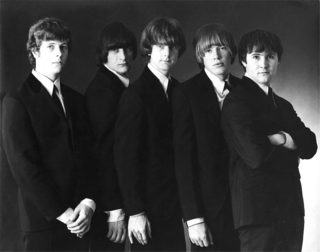
The Byrds were an American rock band formed in Los Angeles, California in 1964. The bulk of the band's releases were issued on Columbia Records or its subsidiaries, except their final studio album, Byrds, and its associated singles, which Asylum Records released in 1973. Before signing a recording contract with Columbia, the band released a single with Elektra Records in 1964 under the name the Beefeaters.
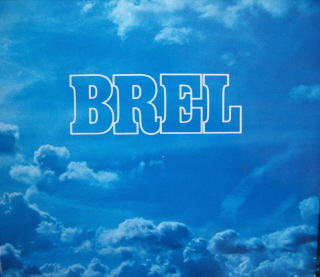
Les Marquises is Jacques Brel's fourteenth and final album. Also known as Brel, the album was released 17 November 1977 by Barclay. This was the singer's first album of new songs in ten years and was released a year before his death from lung cancer. The album's themes include death, parting ("Orly") and in several songs Brel evokes his career in the 1960s. The album was recorded live in Studio B at the Barclay Studios on Avenue Hoche, Paris. With his health failing, Brel was only able to record at most two songs per day. Brel returned to the Marquesas Islands shortly after the recording sessions.
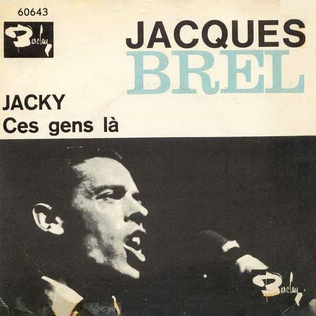
"Jacky" (La chanson de Jacky) is a song written by the Belgian singer-songwriter Jacques Brel and Gérard Jouannest. Brel recorded the song on 2 November 1965, and it was released on his 1966 album Ces gens-là. The song was translated from French into English and retitled "Jackie".

In their native Great Britain, between 1963 and 2019, the English rock band The Searchers released 8 studio albums, 9 extended plays (EPs) and 30 singles. However, the band's international discography is complicated, due to different versions of their albums sometimes being released in other countries, particularly in the US. In some cases, the US version would be an entirely different album with different cover photos and tracks.
A compilation album comprises tracks, which may be previously released or unreleased, usually from several separate recordings by either one performer or by several performers. If the recordings are from one artist, then generally the tracks were not originally intended for release together as a single work, but may be collected together as a greatest hits album or box set. If the recordings are from several artists, there may be a theme, topic, time period, or genre which links the tracks, or they may have been intended for release as a single work—such as a tribute album. When the tracks are by the same recording artist, the album may be referred to as a retrospective album or an anthology.

Madeleine is a song by singer-songwriter Jacques Brel. Brel co-composed the song with musicians Gérard Jouannest and Jean Corti. The song was created in 1961, at The Olympia. The song was first recorded on the 1962 live album Olympia 1961, the last album Brel recorded with the Philips Records. When Brel moved to Barclay Records he released a studio version of the song in 1962 on the album Les Bourgeois, and as a Super 45rpm. It became a classic, and Brel closed his tours at the Olympia with Madeleine in 1964 and 1966.

The albums discography of English singer Cliff Richard consists of 49 studio albums, seven soundtrack albums, 11 live albums, three cast recording albums, 17 mainstream compilation albums, one remix album, 12 box sets, eight gospel compilation albums and 47 EPs. It also includes numerous budget/mid-price compilation albums, repackaged albums, and foreign compilation albums.
